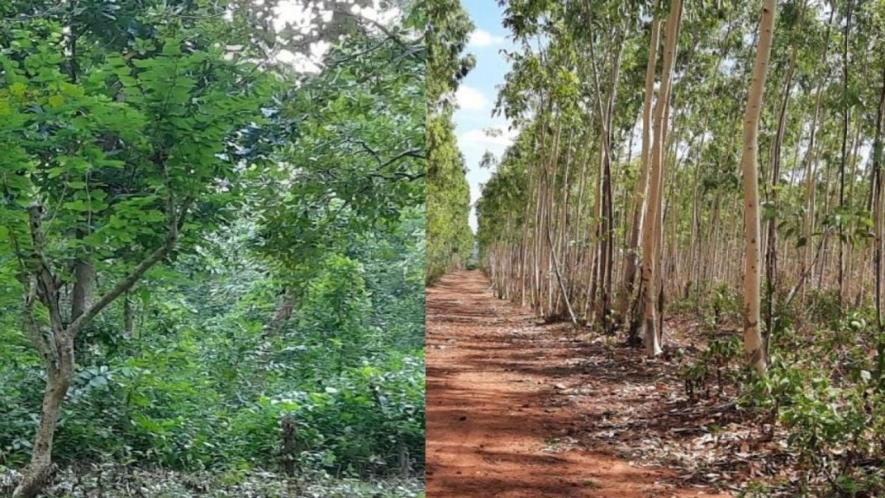Over 90 Former Civil Servants Oppose ‘Green Credit Rules’ Making Corporate Access to Forests Easy

A group of 91 former civil servants on Tuesday wrote an open letter opposing the Green Credit Rules issued by the union government on February 22, saying the government is trying to make it easy for entrepreneurs and industrialists to acquire forests. Green Credit Rules were issued on February 22.
“The scheme’s shortcomings are obvious. No amount of money can be a substitute for the land required for our forests, and for our biodiversity and wildlife to thrive. Yet the government is trying to make it easy for entrepreneurs and industrialists to acquire forest land by permitting them to offer, in exchange, money (in the form of green credits), instead of land for land as was the case so far,” said the former civil servants under the banner Constitutional Conduct Group (CCG), a group that ensures the upholding of the Constitution
The CCG added that, when entrepreneurs can easily obtain forest land, it does not take much imagination to realise that the extent of land legally classified as forests will steadily shrink until there is virtually nothing left. “A new set of Green Credit invaders may ask for diversion of some of our densest and best-protected forests for commercial purposes like mining, industry, and infrastructure,” the CCG said in the open letter.
The Union environment ministry issued a notification last month saying corporations and other private entities can take up plantations on degraded land, including open forest and scrubland, wasteland, and catchment areas, under the administrative control of states to help generate green credits. The credits can be traded and used as a leadership indicator under corporate social responsibility.
State forest departments are required to identify all sparsely covered forest lands within their jurisdiction to be offered to private agencies/investors for funding to support plantations. The forest department has to complete afforestation within two years after receiving money from investors.
CCG said the government seems to have issued the rules in the belief that plantations absorb more carbon than natural scrublands. “This is not true. Plantations are usually fast-growing monocultures and it is a scientifically proven fact that they are poor at carbon sequestration when compared to natural ecosystems. Compensatory afforestation plantations already undertaken in our country are known to have dubious success rates.”
GCC underlined the importance of recognising that green credits as a concept is anachronistic. It added the idea has been seen as a tool for monetising the natural environment and handing it over to corporates for exploitation.
“To allow transfer of pristine forest lands to corporates, in exchange for green credits earned by them, by getting them to fund the forest department to plant degraded forest lands, is shocking indeed. More so, because the ecological values of these lands can be restored by the forest department itself, with the funds already at its disposal. This is a transaction weighted heavily in favour of Big Capital,” the CCG said.
In July 2023, CCG wrote another open letter critiquing the Forest (Conservation) Amendment Act, which allows the diversion of forests for defence/security infrastructure.
Vidhi Centre for Legal Policy led (climate and ecosystems) Debadityo Sinha last month said the rules are unscientific and completely ignore the ecological aspects of forests. “Referring to open forests, scrubland, and catchment areas as ‘degraded’ land parcels is vague… incentivising industrial-scale plantations in such areas will irreversibly alter soil quality, replace local biodiversity, and might be disastrous for local ecosystem services.”
The entire text of the communication may be read here:
| CCG OPEN LETTER TO UNION MINISTER FOR ENVIRONMENT, FORESTS & CLIMATE CHANGE ON GREEN CREDITS
March 19, 2024 To Union Minister for Environment, Forests & Climate Change Government of India Hon’ble Minister, The assault on India’s forests seems continual and unrelenting! The recently passed Forest Conservation Amendment Act 2023 which allows diversion of forests for defence/security infrastructure, feeder roads for road and rail-side establishments, surveys for coal, diamonds, etc. without any oversight of the central government, expert committees or scientists, as stipulated in the past, is a disaster and we in the Constitutional Conduct Group had written an earlier open letter on 12 July 2023 criticising this. The government has now come up with certain rules that will further worsen the disaster: the provision for earning Green Credits by agencies seeking to take possession of forest lands for “developmental” projects. We are a group of former civil servants who have served the Central and State governments in various capacities. We have no affiliation with any political party but feel strongly about upholding the provisions of the country’s Constitution. It, therefore, disturbs us greatly to find that the responsibility that is enjoined on every citizen under Article 51A (g) of the Constitution, ‘to protect and improve the natural environment including forests, lakes, rivers and wildlife . . . ’, is disregarded and violated by the government. Many people would be aware of the significant efforts made over the years to save the forests of India, especially through the Forest Conservation Act, 1980 and Supreme Court orders. During the period from Independence to the enactment of the Forest Conservation Act 1980, some 4.2 million hectares of forests had been converted to other uses such as real estate, infrastructure, mines, etc. After the 1980 Act, diversion of forest land, from 1980 until recently, was reduced to approximately 1.5 million hectares, as any diversion needed to be first approved by the central government. Protection of forests was further strengthened by the Supreme Court judgement in 1996, commonly called the Godavarman case, which recognised forests as per the dictionary meaning. It also brought under the oversight of the central government forested areas with other agencies like the revenue department, the railways, and private owners. It is widely accepted that these two actions have saved the forests of India from decimation. It pains us to see that the government is now undoing the good that was done. And that this is being done when the whole planet faces the crises of climate change and global warming. The Forest Conservation Act 1980 brought in checks and balances over diversion of forest lands keeping in mind the ecological importance of our forests and biodiversity and their role in the sustenance of people. That Act recognized that when it was inevitable to divert forests for any human centric development activity, an equal area of land outside forests needed to be obtained by the user agency and given to the forest department for afforestation (called compensatory afforestation), so as to ensure that the area of forest land in the country does not get reduced. However, this paradigm is set to change with the Ministry of Environment, Forests, and Climate Change (MOEFCC) bringing in the Green Credit Initiative in October 2023 and the Green Credit Rules on 22 February 2024. These Rules require state forest departments to identify all sparsely covered ‘forest’ lands within their jurisdiction. These lands will then be offered to private agencies/investors for funding to support planting. On payment of the funds by the investor, the forest department will complete afforestation within two years. For each tree planted, the investor earns one green credit. These green credits can then be traded by the investor for diversion of forest lands for non-forestry activities. The scheme’s shortcomings are obvious. No amount of money can be a substitute for the land required for our forests, and for our biodiversity and wildlife to thrive. Yet the government is trying to make it easy for entrepreneurs and industrialists to acquire forest land by permitting them to offer, in exchange, money (in the form of green credits), instead of land for land as was the case so far. When forest land can be so easily obtained by private entrepreneurs, it does not take much imagination to realise that the extent of land legally classified as forests at present will steadily shrink until there is virtually nothing left. A new set of Green Credit invaders may ask for diversion of some of our densest and best protected forests for commercial purposes like mining, industry and infrastructure. According to foresters and environmentalists, a dangerous fallout of this order is the ecological disaster that will follow by planting up all kinds of ecosystems with trees. Measuring forests merely by tree count is totally wrong. All forest lands, whether grasslands, wetlands, deserts, scrub forests or open forests are ecological entities in themselves. They harbour a wide variety of animal species endemic to the Indian subcontinent, such as the Great Indian Bustard, the Lesser Florican, blackbucks, wolves, etc. Taking up plantations in these areas will mean an end to the survival of these and other species. But it is not merely the lives of animal species that is at stake. The livelihood of millions of pastoral and semi-pastoral communities depend on these ‘scrub’ and ‘waste lands’, and they will be directly and adversely impacted by this scheme. The government has issued these orders, ostensibly in the belief that plantations absorb more carbon than natural scrublands. This is not true. Plantations are usually fast-growing monocultures and it is a scientifically proven fact that they are poor at carbon sequestration when compared to natural ecosystems. Compensatory afforestation plantations already undertaken in our country are known to have dubious success rates. At any rate, the government also has huge unspent funds for such afforestation programmes and does not need further investment from any private agency. It would be a much better plan to merely protect and restore these degraded lands to their original condition. This would result in more carbon sequestration, survival of varied ecosystems and endangered species, and would also serve the needs of people. This would not, however, benefit the private sector at the cost of the community and the country at large. That such an unscientific order should be issued from the MOEFCC is truly unfortunate, considering that it has in its fold the highly trained, technical Indian Forest Service. It is not only contrary to this service’s mandate of protecting forests and wildlife but also negates the unswerving commitment of its officers to preserve and protect the environment. It is also important to recognise that ‘green credits’ as a concept is anachronistic, and has been seen as a tool for monetising the natural environment and handing it over to corporates for exploitation. To allow transfer of pristine forest lands to corporates, in exchange for green credits earned by them, by getting them to fund the forest department to plant degraded forest lands, is shocking indeed. More so, because the ecological values of these lands can be restored by the forest department itself, with the funds already at its disposal. This is a transaction weighted heavily in favour of Big Capital. If the government is really serious about conservation with financial help from the private sector, it should permit relevant, impactful conservation projects as eligible activities under the law governing Corporate Social Responsibility. Quick, smooth and easy diversion of our forest lands in favour of user agencies is apparently the sole intention of this set of Green Credit rules. We urge the MOEFCC to recognize this danger and withdraw the Green Credits notification expeditiously. SATYAMEVA JAYATE Yours faithfully, Constitutional Conduct Group (91 signatories, as below) |
| Anita Agnihotri | IAS (Retd.) | Former Secretary, Department of Social Justice Empowerment, GoI | |
| Anand Arni | RAS (Retd.) | Former Special Secretary, Cabinet Secretariat, GoI | |
| J.L. Bajaj | IAS (Retd.) | Former Chairman, Administrative Reforms and Decentralisation Commission, Govt. of Uttar Pradesh | |
| G. Balachandhran | IAS (Retd.) | Former Additional Chief Secretary, Govt. of West Bengal | |
| Vappala Balachandran | IPS (Retd.) | Former Special Secretary, Cabinet Secretariat, GoI | |
| Gopalan Balagopal | IAS (Retd.) | Former Special Secretary, Govt. of West Bengal | |
| Chandrashekar Balakrishnan | IAS (Retd.) | Former Secretary, Coal, GoI | |
| Sharad Behar | IAS (Retd.) | Former Chief Secretary, Govt. of Madhya Pradesh | |
| Aurobindo Behera | IAS (Retd.) | Former Member, Board of Revenue, Govt. of Odisha | |
| Madhu Bhaduri | IFS (Retd.) | Former Ambassador to Portugal | |
| Pradip Bhattacharya | IAS (Retd.) | Former Additional Chief Secretary, Development & Planning and Administrative Training Institute, Govt. of West Bengal | |
| Nutan Guha Biswas | IAS (Retd.) | Former Member, Police Complaints Authority, Govt. of NCT of Delhi | |
| Ravi Budhiraja | IAS (Retd.) | Former Chairman, Jawaharlal Nehru Port Trust, GoI | |
| Sundar Burra | IAS (Retd.) | Former Secretary, Govt. of Maharashtra | |
| R. Chandramohan | IAS (Retd.) | Former Principal Secretary, Transport and Urban Development, Govt. of NCT of Delhi | |
| Ranjan Chatterjee | IAS (Retd.) | Former Chief Secretary, Govt. of Meghalaya & former Expert Member, National Green Tribunal | |
| Kalyani Chaudhuri | IAS (Retd.) | Former Additional Chief Secretary, Govt. of West Bengal | |
| Gurjit Singh Cheema | IAS (Retd.) | Former Financial Commissioner (Revenue), Govt. of Punjab | |
| F.T.R. Colaso | IPS (Retd.) | Former Director General of Police, Govt. of Karnataka & former Director General of Police, Govt. of Jammu & Kashmir | |
| Anna Dani | IAS (Retd.) | Former Additional Chief Secretary, Govt. of Maharashtra | |
| Vibha Puri Das | IAS (Retd.) | Former Secretary, Ministry of Tribal Affairs, GoI | |
| P.R. Dasgupta | IAS (Retd.) | Former Chairman, Food Corporation of India, GoI | |
| Pradeep K. Deb | IAS (Retd.) | Former Secretary, Deptt. Of Sports, GoI | |
| Nitin Desai | Former Chief Economic Adviser, Ministry of Finance, GoI | ||
| M.G. Devasahayam | IAS (Retd.) | Former Secretary, Govt. of Haryana | |
| Sushil Dubey | IFS (Retd.) | Former Ambassador to Sweden | |
| A.S. Dulat | IPS (Retd.) | Former OSD on Kashmir, Prime Minister’s Office, GoI | |
| K.P. Fabian | IFS (Retd.) | Former Ambassador to Italy | |
| Prabhu Ghate | IAS (Retd.) | Former Addl. Director General, Department of Tourism, GoI | |
| Suresh K. Goel | IFS (Retd.) | Former Director General, Indian Council of Cultural Relations, GoI | |
| S.K. Guha | IAS (Retd.) | Former Joint Secretary, Department of Women & Child Development, GoI | |
| H.S. Gujral | IFoS (Retd.) | Former Principal Chief Conservator of Forests, Govt. of Punjab | |
| Meena Gupta | IAS (Retd.) | Former Secretary, Ministry of Environment & Forests, GoI | |
| Wajahat Habibullah | IAS (Retd.) | Former Secretary, GoI and former Chief Information Commissioner | |
| Vivek Harinarain | IAS (Retd.) | Govt. of Tamil Nadu | |
| Kamal Jaswal | IAS (Retd.) | Former Secretary, Department of Information Technology, GoI | |
| Naini Jeyaseelan | IAS (Retd.) | Former Secretary, Inter-State Council, GoI | |
| Najeeb Jung | IAS (Retd.) | Former Lieutenant Governor, Delhi | |
| Gita Kripalani | IRS (Retd.) | Former Member, Settlement Commission, GoI | |
| Ish Kumar | IPS (Retd.) | Former DGP (Vigilance & Enforcement), Govt. of Telangana and former Special Rapporteur, National Human Rights Commission | |
| Sudhir Kumar | IAS (Retd.) | Former Member, Central Administrative Tribunal | |
| Subodh Lal | IPoS (Resigned) | Former Deputy Director General, Ministry of Communications, GoI | |
| Harsh Mander | IAS (Retd.) | Govt. of Madhya Pradesh | |
| Amitabh Mathur | IPS (Retd.) | Former Special Secretary, Cabinet Secretariat, GoI | |
| Aditi Mehta | IAS (Retd.) | Former Additional Chief Secretary, Govt. of Rajasthan | |
| Sonalini Mirchandani | IFS (Resigned) | GoI | |
| Malay Mishra | IFS (Retd.) | Former Ambassador to Hungary | |
| Satya Narayan Mohanty | IAS (Retd.) | Former Secretary General, National Human Rights Commission | |
| Deb Mukharji | IFS (Retd.) | Former High Commissioner to Bangladesh and former Ambassador to Nepal | |
| Shiv Shankar Mukherjee | IFS (Retd.) | Former High Commissioner to the United Kingdom | |
| Gautam Mukhopadhaya | IFS (Retd.) | Former Ambassador to Myanmar | |
| Nagalsamy | IA&AS (Retd.) | Former Principal Accountant General, Tamil Nadu & Kerala | |
| Sobha Nambisan | IAS (Retd.) | Former Principal Secretary (Planning), Govt. of Karnataka | |
| Ramesh Narayanaswami | IAS (Retd.) | Former Chief Secretary, Govt. of NCT of Delhi | |
| Surendra Nath | IAS (Retd.) | Former Member, Finance Commission, Govt. of Madhya Pradesh | |
| P. Joy Oommen | IAS (Retd.) | Former Chief Secretary, Govt. of Chhattisgarh | |
| Amitabha Pande | IAS (Retd.) | Former Secretary, Inter-State Council, GoI | |
| Maxwell Pereira | IPS (Retd.) | Former Joint Commissioner of Police, Delhi | |
| R. Poornalingam | IAS (Retd.) | Former Secretary, Ministry of Textiles, GoI | |
| Rajesh Prasad | IFS (Retd.) | Former Ambassador to the Netherlands | |
| R.M. Premkumar | IAS (Retd.) | Former Chief Secretary, Govt. of Maharashtra | |
| Rajdeep Puri | IRS (Resigned) | Former Joint Commissioner of Income Tax, GoI | |
| N.K. Raghupathy | IAS (Retd.) | Former Chairman, Staff Selection Commission, GoI | |
| V.P. Raja | IAS (Retd.) | Former Chairman, Maharashtra Electricity Regulatory Commission | |
| V. Ramani | IAS (Retd.) | Former Director General, YASHADA, Govt. of Maharashtra | |
| K. Sujatha Rao | IAS (Retd.) | Former Health Secretary, GoI | |
| M.Y. Rao | IAS (Retd.) | ||
| Satwant Reddy | IAS (Retd.) | Former Secretary, Chemicals and Petrochemicals, GoI | |
| Vijaya Latha Reddy | IFS (Retd.) | Former Deputy National Security Adviser, GoI | |
| Julio Ribeiro | IPS (Retd.) | Former Director General of Police, Govt. of Punjab | |
| Aruna Roy | IAS (Resigned) | ||
| Manabendra N. Roy | IAS (Retd.) | Former Additional Chief Secretary, Govt. of West Bengal | |
| A.K. Samanta | IPS (Retd.) | Former Director General of Police (Intelligence), Govt. of West Bengal | |
| Deepak Sanan | IAS (Retd.) | Former Principal Adviser (AR) to Chief Minister, Govt. of Himachal Pradesh | |
| G.V. Venugopala Sarma | IAS (Retd.) | Former Member, Board of Revenue, Govt. of Odisha | |
| S. Satyabhama | IAS (Retd.) | Former Chairperson, National Seeds Corporation, GoI | |
| N.C. Saxena | IAS (Retd.) | Former Secretary, Planning Commission, GoI | |
| A. Selvaraj | IRS (Retd.) | Former Chief Commissioner, Income Tax, Chennai, GoI | |
| Abhijit Sengupta | IAS (Retd.) | Former Secretary, Ministry of Culture, GoI | |
| Aftab Seth | IFS (Retd.) | Former Ambassador to Japan | |
| Ashok Kumar Sharma | IFoS (Retd.) | Former MD, State Forest Development Corporation, Govt. of Gujarat | |
| Ashok Kumar Sharma | IFS (Retd.) | Former Ambassador to Finland and Estonia | |
| Navrekha Sharma | IFS (Retd.) | Former Ambassador to Indonesia | |
| Raju Sharma | IAS (Retd.) | Former Member, Board of Revenue, Govt. of Uttar Pradesh | |
| Avay Shukla | IAS (Retd.) | Former Additional Chief Secretary (Forests & Technical Education), Govt. of Himachal Pradesh | |
| Tara Ajai Singh | IAS (Retd.) | Former Additional Chief Secretary, Govt. of Karnataka | |
| A.K. Srivastava | IAS (Retd.) | Former Administrative Member, Madhya Pradesh Administrative Tribunal | |
| Prakriti Srivastava | IFoS (Retd.) | Former Principal Chief Conservator of Forests & Special Officer, Rebuild Kerala Development Programme, Govt. of Kerala | |
| Parveen Talha | IRS (Retd.) | Former Member, Union Public Service Commission | |
| Anup Thakur | IAS (Retd.) | Former Member, National Consumer Disputes Redressal Commission | |
| P.S.S. Thomas | IAS (Retd.) | Former Secretary General, National Human Rights Commission |
Get the latest reports & analysis with people's perspective on Protests, movements & deep analytical videos, discussions of the current affairs in your Telegram app. Subscribe to NewsClick's Telegram channel & get Real-Time updates on stories, as they get published on our website.
























